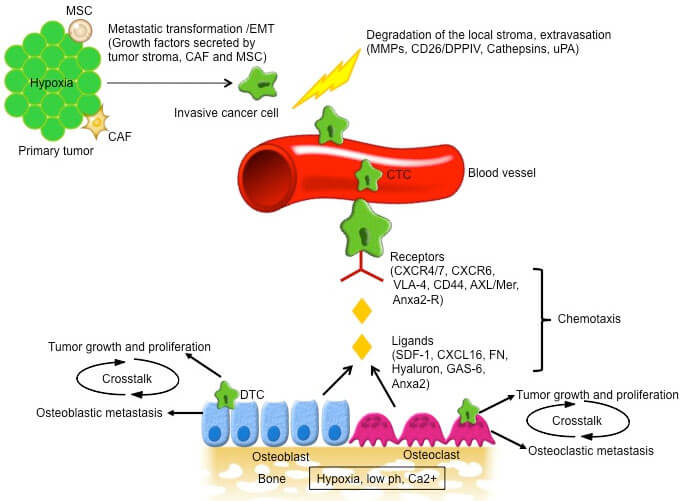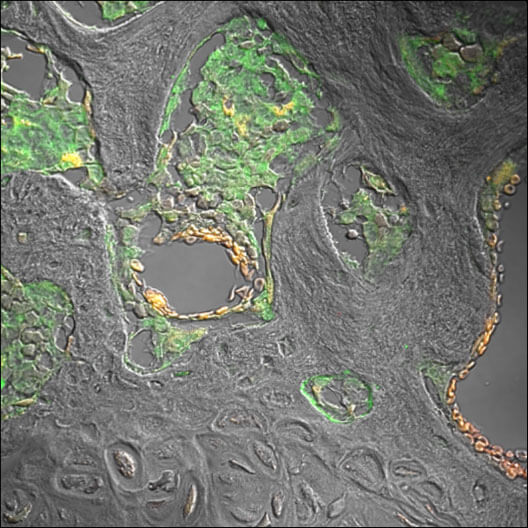Kenneth Pienta Laboratory
Led by Kenneth Pienta, M.D., the Pienta Laboratory is focused on research to define the tumor microenvironment as well as develop new therapies for prostate cancer. Dr. Pienta utilizes the principles of ecology and evolutionary dynamics to study cancer.
Between 1995 and 2013, Dr. Pienta was the director of the Prostate Specialized Program of Research Excellence (SPORE) at the University of Michigan and from 2013-present he has been co-Director of the Prostate SPORE at Johns Hopkins. He has been continuously funded by the NIH since 1991 and has a proven, peer-reviewed track record in organizing and administering a translational research program that successfully incorporates bench research, agent development and clinical application.
Dr. Pienta has international expertise in the development of novel chemotherapeutic programs for cancer and has championed the concept that translational research is often best accomplished by multidisciplinary teams of scientists and clinicians.
He is the author of more than 500 peer-reviewed articles and been the principal investigator on numerous local and national clinical trials. Throughout his career, Dr. Pienta has effectively mentored more than 50 students, residents and fellows to successful careers in medicine.
Lab: Targeting the Cancer Ecosystem

The Pienta laboratory focuses on gaining insight into the biologic mechanisms underlying prostate cancer metastasis. These insights have been used to identify novel targets for the treatment of advanced prostate cancer, thus successfully moving bench research into the clinic in the form of phase II and phase III clinical trials. Currently, the Pienta lab operates under the hypothesis that there is an opportunity to devise new cancer therapies based on the recognition that tumors have properties of ecological systems. There has been an increasing recognition that the tumor microenvironment contains host non-cancer cells in addition to cancer cells, interacting in a dynamic fashion over time. The cancer cells compete and/or cooperate with nontumor cells, and the cancer cells may compete and/or cooperate with each other. The interaction of these cancer and host cells to remodel the normal host organ microenvironment may best be conceptualized as an evolving ecosystem. We have used microdevices to help design ecosystems to mimic organ niches, such as bone marrow, to which cancer cells metastasize. Describing tumors as these ecological systems defines new opportunities for novel cancer therapies.
Our Hypothesis
We operate under the hypothesis that there is an opportunity to devise new cancer therapies based on the recognition that tumors have properties of ecological systems:
- There has been an increasing recognition that the tumor microenvironment contains host non-cancer cells in addition to cancer cells, interacting in a dynamic fashion over time.
- Cancer cells compete and/or cooperate with nontumor cells, and the cancer cells may compete and/or cooperate with each other.
- The interaction of these cancer and host cells to remodel the normal host organ microenvironment may best be conceptualized as an evolving ecosystem.
We have used microdevices to help design ecosystems to mimic organ niches, such as bone marrow, to which cancer cells metastasize. Describing tumors as these ecological systems defines new opportunities for novel cancer therapies.
Our Research
-
A variety of tumor cells prefer to home in on the bone. The homing of cancer cells to the bone represents a multistep process that involves:
- Malignant progression of the tumor
- Invasion of the tumor through the extracellular matrix and the blood vessels
- Settling of the tumor cells in the bone
The Skeletal Metastasis PO1 grant is dedicated to gaining a greater understanding of the mechanisms used by cancer cells in these processes. We hope that this understanding will facilitate the design of drugs that could specifically target the homing process as well as the growth of cancer cells in the bone.

-
PI name: Russell Taichman ([email protected])
Institute: University of Michigan at Ann Arbor
Co-PIs: Kenneth Pienta and Yusuke Shiozawa ([email protected])Mr. W. is a 66-year-old man. Six years ago he was diagnosed with a moderately differentiated, localized prostate cancer (PCa) when he presented for a routine physical exam and was found to have a prostate specific antigen (PSA) blood test of 5.2. Digital rectal exam revealed no abnormalities but prostate ultrasound and biopsy revealed a Gleason 4+3 = 7 cancer in 2/12 biopsy cores (clinical stage TIcNxMx).
Because Mr. W. was in otherwise excellent health, he chose to undergo a radical retropubic prostatectomy and his prostate was removed. All of his lymph nodes were negative for cancer. He was considered to be cured of his disease. One year ago, Mr. W.’s PSA became detectable and he now has three lesions present on bone scan. He has metastatic prostate cancer, now incurable.
Each year, approximately 40,000 men who should have been cured of their prostate cancer by surgery or radiation therapy present with incurable metastatic disease that will manifest itself as metastatic lesions in the bone, usually years after primary treatment.
The only explanation for this is that disseminated tumor cells (DTCs) are present in the bone microenvironment before surgery or radiation eradicated the primary tumor. Clearly the ability of DTCs to proliferate, undergo apoptosis or become dormant must occur soon after the initial arrest of circulating tumor cells (CTCs) in the marrow.
Unquestionably, a greater understanding of the molecular events that regulate a DTC’s ability to become and remain dormant over long periods is crucial to define new therapeutic strategies to combat disease progression. How these cells traffic to the bone, become dormant and then ultimately begin to proliferate is the subject of this TMEN application.
The TMEN is composed of highly interactive and complementary projects that are supported by a human sample acquisition core (HSAC). Ultimately this work will lead to defining new therapeutic strategies to combat PCa skeletal metastases. The findings generated by this program will lead to a significant impact on the health and well being of men with PCa. The global hypothesis is that DTCs target the hematopoietic stem cell (HSC) niche during metastasis. Once in the niche, the niche regulates dormancy of DTCs. When DTCs are able to overcome the growth regulatory effects of the HSC niche, metastatic foci develop.

-
Ecologists have studied the population biology of invasive species for decades and have documented their impact on local environments as well as on the global ecosystem. The life cycle of invasive species is directly analogous to the study of cancer metastasis, as illustrated and explained below.
The Life Cycle of Invasive Species in the Environment
Invasive species start as a native population within a defined community and are then transported by some means to a new environment. In this new environment, the invader either then dies off or enters a period during which it establishes itself (lag period). It then begins to spread and have impact on the local environment, disrupting the ecosystem.
This disruption has broad implications for the native species and the broader ecosystem. Biologic traits that result in a robust invasive species include rapid proliferative capacity, adaptation to environmental stress (phenotypic plasticity) and high tolerance to environmental heterogeneity.
Cancer as an Invasive Species
Cancer metastasis follows a comparable life cycle. Cancer must grow in a primary site, extravasate, and survive in the circulation to then intravasate at a target organ (invasive species survival in transport). Cancer cells often lay dormant at their metastatic site for a long period of time (lag period) before proliferating (invasive spread).
Proliferation in the new site has an impact on the target organ microenvironment (ecological impact) and eventually the human host (biosphere impact). Chen KW, Pienta KJ. Modeling invasion of metastasizing cancer cells to bone marrow utilizing ecological principles. Theor Biol Med Model 2011 Oct 3;8:36.
A large proportion of solid tumor metastases are bone metastases, known to usurp hematopoietic stem cell (HSC) homing pathways to establish footholds in the bone marrow. Evidence from the Pienta lab and others suggests that tumor cells target and parasitize the HSC niche during metastasis just as invasive species do in the environment. Successful metastatic cancer cells grow in a primary site, emigrate out from that site, survive during migration, immigrate into the new environment and then naturalize and overtake/co-opt and/or cooperate with the host species to form a new tumor ecosystem.

-
The specific mechanisms of how the microenvironment regulates prostate cancer progression remain poorly understood. The combined previous studies of Dr. Kenneth Pienta from Johns Hopkins and Dr. David Rowley from Baylor College of Medicine have revealed that tumor-associated macrophages (TAMs) and reactive stroma both promote prostate cancer progression.
- Dr. Pienta has demonstrated a major role for CCL2 in prostate tumor growth and metastasis through its regulatory role in mediating monocyte/macrophage infiltration into the tumor microenvironment and stimulating a phenotypic change to TAMs within these immune cells to promote tumor growth.
- Dr. Rowley has demonstrated that human prostate cancer reactive stroma is composed of myofibroblasts that initiate during PIN and continually co-evolve with adjacent carcinoma during organ-confined progression.
Hypothesis
The overall hypothesis of this application is that TAMs and reactive stroma serve as complementary coregulators of each other and together promote prostate cancer growth in primary and metastatic sites.
These aims will use the extensive set of human normal and prostate cancer samples in the Baylor University and University of Michigan SPORE tissue banks, including samples obtained through the rapid autopsy program and samples from the mouse models of prostate cancer growth in primary prostate and bone.
Central question 1: What is the relationship between TAMs and the development of reactive stroma myofibroblasts?
Specific aim 1: Define the mechanisms by which TAMs promote myofibroblast differentiation and function. This aim will:
- Define the temporal relationship between the presence of TAMs, the development of reactive stroma and the development of primary and metastatic prostate cancers using novel transgenic mouse models.
- Determine the role of reactive stroma/myofibroblasts in the recruitment of macrophages using a human cancer/stromal recombination xenograft model.
- Compare and contrast the factors that are secreted by TAMs that affect the differentiation of myofibroblasts in primary and metastatic prostate cancer sites using a novel vossicle implant model.
- To assess the effects of disruption of the CCL2 /TAM axis in the bone microenvironment on PCa cell homing, growth in bone and bone destruction using a novel intramarrow transplant approach.
Subaims will determine the effects of depleting TAMs on PCa tumorigenesis and PCa growth in bone, utilizing novel preclinical and transgenic models. We will deplete the tumor microenvironment of TAMs by blocking TAM chemoattraction through manipulation of the CCL2/CCR2 axis in primary and metastatic tumor models, including homozygous SCID/CCL2-/- and SCID/CCR2-/- mice as well as the transplanted vossicle model.
Central question 2: What is the composition of human prostate cancer reactive stroma?
Specific aim 2: To determine the composition of reactive stroma within prostate cancer bone metastases. This aim will determine:
- Which reactive stroma biomarkers co-evolve in a temporal and spatial pattern with prostate cancer bone metastases.
- How these biomarkers correlate with gene expression profiles from laser-captured reactive stroma.
- Whether these biomarkers correlate with reactive stroma markers of primary prostate cancer development.
- The effects of disruption of the CCL2 /TAM axis in primary prostate cancers and bone microenvironment on reactive stroma using novel models.
-
Overdiagnosis of Prostate Cancer Can Lead to Unnecessary Treatment
Prostate cancer is the most commonly diagnosed visceral malignant neoplasm and remains the second most common cause of cancer related death among American men. Widespread use of PSA screening has resulted in the earlier detection of prostate cancer with only 5% of men today presenting with metastatic disease. Advocates of PSA screening argue that it has contributed to the 30% decrease in prostate cancer mortality since its peak in the early 1990s, however screening has also resulted in an estimated over diagnosis of approximately 100,000 cases of prostate cancer annually.
Often this overdiagnosis leads to unnecessary treatment and treatment associated morbidity for cancers that in hindsight were indolent. Conversely, many highly aggressive, progressive cancers detected today are undertreated due to a lack of appreciation of aggressiveness or inappropriate primary treatment — particularly among African American men. In sum, there is an urgent need to develop minimally invasive tools that accurately distinguish indolent cancers that can be safely monitored from progressive cancers that require appropriate therapeutic interventions.
Current Assessment Tools Can’t Always Distinguish Between Indolent and Higher Risk Tumors
Today, initial treatment decisions are guided by prostate cancer risk stratification algorithms, based primarily on PSA, clinical stage, and biopsy Gleason sum (Cancer grade). Among these parameters, the most potent predictor of prostate cancer mortality is Gleason grade; the presence of low Gleason grade cancer is associated with very low cancer specific mortality rates even in the absence of intervention. Approximately 40-50% of newly diagnosed PSA screen detected cancers are low grade (Gleason score 3+3=6) and data from our institution suggests that the vast majority of these cases will not progress to aggressive disease.
Intermediate grade disease (Gleason score 3+4=7) have a much more variable course with upwards of 30% of these men progressing to aggressive disease. Conversely, localized high Gleason grade (Gleason score 4+3=7 and 8–10) disease often, albeit not always, portends a poor prognosis with upwards of 30% of newly diagnosed patients detected by PSA screening falling into this high-risk category at diagnosis. It is this subset of men who account for the highest density of prostate cancer deaths, as even after local therapy these tumors often progress to symptomatic metastatic disease. Thus, localized prostate cancers present in one of three main categories – Localized Indolent (Gleason 6), Localized Indeterminate Kinetics (Gleason 3+4=7) and Localized with Lethal potential (Gleason ≥4+3). Although current risk stratification tools are moderately effective, limitations remain in their ability to distinguish disease with a truly indolent course from those that have potential to progress to symptomatic disease and to lethal tumors.
Our Hypothesis
We hypothesize that within prostate cancers and their adjacent microenvironment there are distinctive molecular signatures that predict the subsequent fates of early lesions distinguishing indolent from progressive disease. The identification of these signatures will facilitate the development of minimally invasive methods to establish the phenotype of a tumor and predict its potential kinetics.
Study Goals
The goals of this proposal are to utilize our extensive sets of human biospecimens from men with prostate cancer followed longitudinally from the Johns Hopkins Prostate Cancer SPORE and Prostate Cancer Biorepository Network (PCBN), the JHU Active Surveillance cohort, and the Baltimore longitudinal study of Aging (BLSA) to perform the following specific aims:
- Aim 1: Delineate the molecular signatures of Localized Indolent and Localized with Lethal potential prostate cancer by profiling primary tumors from prostatectomy specimens with long term outcomes. We will determine: 1) The comprehensive genetic, epigenetic and phenotypic features/alterations of tumor cells; 2) the heterogeneous nature of such alterations; and 3 ) comprehensive epigenetic and phenotypic changes of the accompanying microenvironmental cells including specific subsets of inflammatory cell types and tumor associated stromal cell types. Integrated bioinformatics and biostatistical approaches will be used to develop the indolent vs. aggressive signatures.
- Aim 2: Validate Localized Indolent and Localized with Lethal potential signatures on independent JHU datasets including an active surveillance cohort of 600 men serially biopsied and followed expectantly and the Baltimore Longitudinal Study of Aging observational cohort as well as, cohorts from outside our institution.
- Aim 3: Assess ability of Localized Indolent and Localized with Lethal potential signatures developed in Aim 2 to distinguish prostate cancers categorized as Localized Indeterminate Kinetics.
- Aim 4: Develop minimally invasive tools to distinguish and predict the fate of early lesions. This aim will determine whether some of the key distinguishing molecular features of indolent vs. aggressive lesions are also present in: urine, plasma, serum, circulating tumor cells or bone marrow from prostate cancer patients. We will also determine whether some of the alterations can be used to develop novel molecular imaging reagents and to develop enhanced tools to predict disease kinetics.
- Aim 5: To contribute to the Network’s development of a prospective biorepository of fresh frozen prostate tumors and benign tissues from radical prostatectomies and autopsy. Also to contribute plasma, serum, urine, bone marrow, and CTCs from RRP patients as well as patients with biochemical recurrence and symptomatic disease with metastatic cancer.
- Aim 6: To contribute expertise and methodology to the Network investigators regarding molecular profiling, bioinformatics, molecular pathology, and clinical outcomes.

